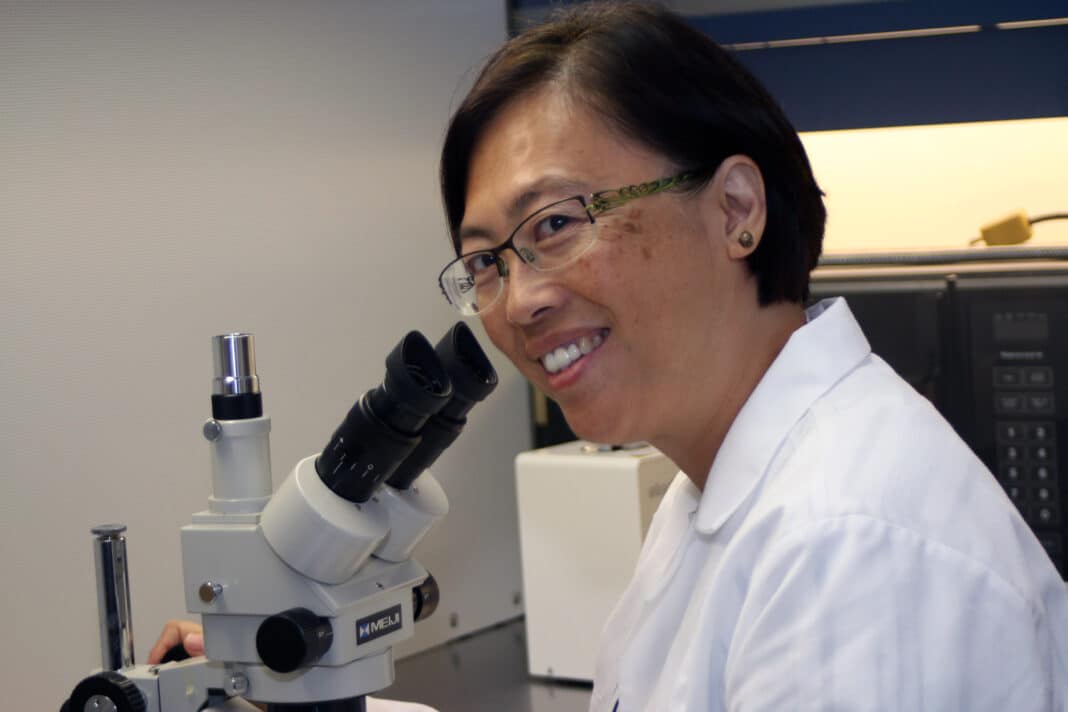Being the daughter of a potato researcher, Helen Tai grew up in the potato world but didn’t expect to work in it herself.
As a child, Helen Tai had a front row seat to the potato research world. Her father, George Tai, worked as a potato researcher at Agriculture and Agri-Food Canada (AAFC)’s Fredericton Research and Development Centre (where Helen would later work herself).
“(My father and I) have a very close relationship, obviously, because now we’re working on the same thing. But even before we had lots of discussions about science in general, and obviously, a lot of my interest in science is because of him,” Helen says in a phone interview.
Growing up, Helen found herself listening to her father talk about his research around the dinner table. And during the summer, their family vacations would be tied to George’s attendance at the Potato Association of America (PAA) annual meeting.
When the time came for Helen to head off to university, she decided to remain in the science research realm, but instead of potatoes she studied mammalian genetics. She received her bachelor of science in biochemistry and master of science in anatomy degrees at the University of Toronto. Her PhD research work at the University of Ottawa focused on human and mouse genetics.
“It wasn’t until I finished my PhD, that I started to think that I am interested in more issues concerning food and agriculture and environment, and things like that. That’s when I decided to switch and do something with plants,” Helen explains.
She took a post-doctoral fellowship at the Canadian Forest Service in Fredericton, N.B. studying trees. Helen spent three years there as a post-doctoral student and two years as a research scientist. In 2006, an opportunity presented itself at AAFC Fredericton to work as a research scientist in potato genetics and genomics.
“I thought it would be interesting to work on potato after all these years of hearing about it from my dad. I gained a better appreciation of it after I finished all my education and started my postdoc,” Helen explains.
From there, her career in the potato industry flourished. Helen has worked on research projects such as looking at Colorado potato beetle (CPB) resistance, utilizing wild relatives in potato breeding and notably Verticillium resistance which is where she worked with Dennis Halterman. The two had met through their involvement in PAA but it wasn’t until they collaborated on the Verticillium research project looking at verticillium resistance that they became friends.
“She had tremendous expertise in potato genetics and was interested in disease resistance. My research is really focused on disease resistance in potato, and she needed someone with a little more expertise on the pathogen side,” Halterman, a research geneticist with the United States Department of Agriculture, says in a phone interview. “It worked out being a perfect collaboration between our groups.”
The two also worked together through the PAA. Helen was PAA president in 2021 while Halterman recently began his term as president this year.
“She really pushed for getting more involvement from students and early career scientists — getting them involved in PAA and the annual meeting — which has been a tremendous benefit to the society to get more students coming to the meeting and talking about their research,” Halterman explains.
Not only has Helen served on the PAA board, she also has been a supporter of the PAA annual meeting’s charity auction. She has become known for donating her handmade CPB jewelry. Helen encases CPB’s in acrylic to make earrings and necklaces. She originally made the jewelry as a child with her father, donating them to the PAA where they were a popular item. Once she started working as a potato researcher, she decided to revive the hobby.
“It’s a good mix of artistry and science. I think she’s going to figure out how to get the (potato) flowers into her jewelry too. But she’s got to do some experimentation to figure out what works best,” Halterman says.
Header photo — Agriculture and Agri-Food Canada Research Scientist in Potato Genetics and Genomics Helen Tai
Related Articles
True Potato Seeds Could Feed the World









